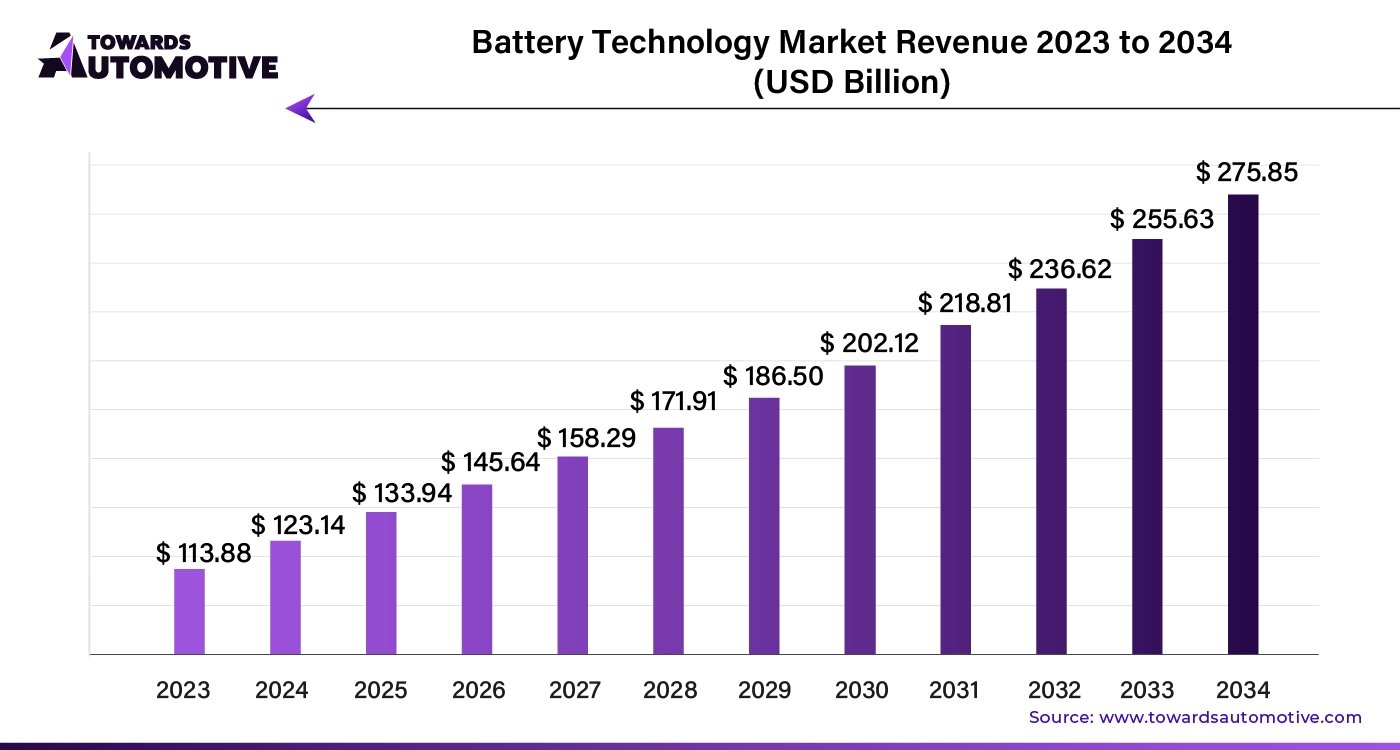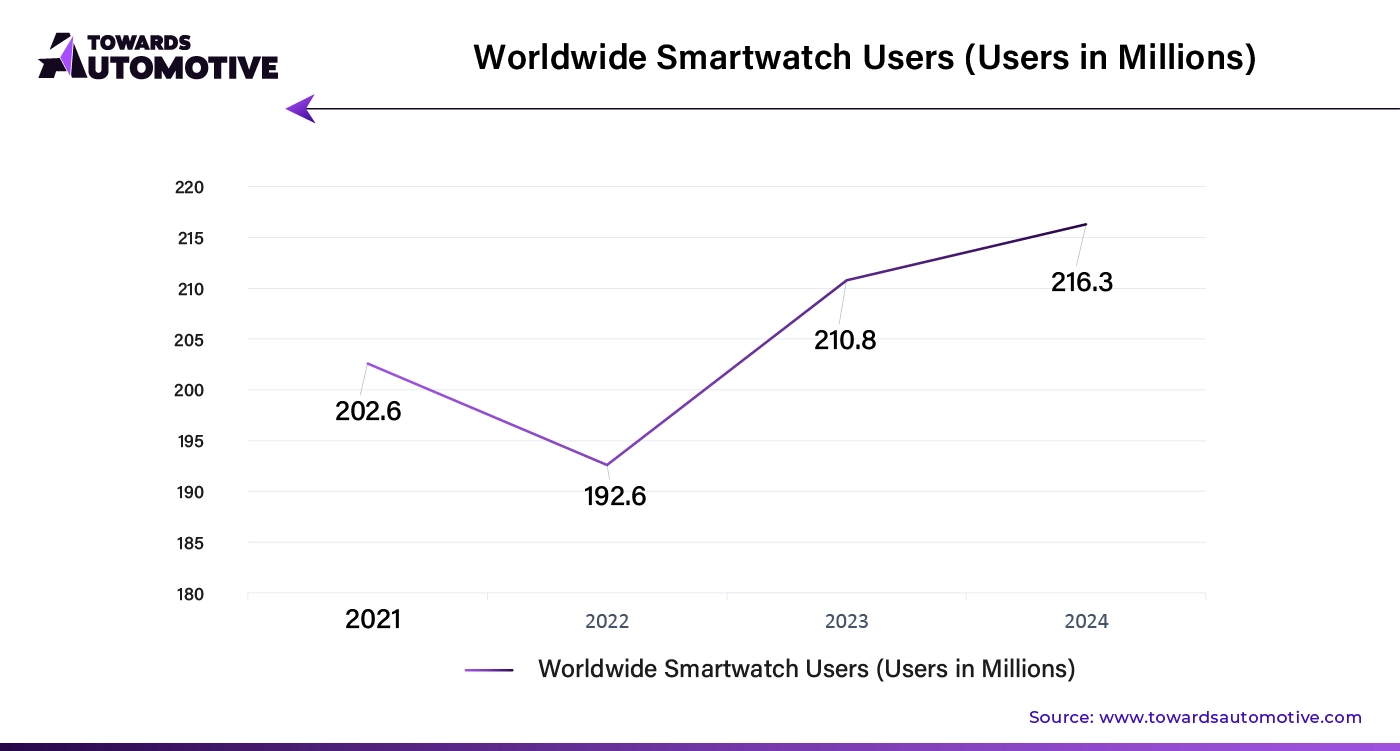July 2025
The global battery technology market size is calculated at USD 123.14 billion in 2024 and is expected to be worth USD 275.85 billion by 2034, expanding at a CAGR of 8.5% from 2024to 2034.

Unlock Infinite Advantages: Subscribe to Annual Membership
The consumer electronics industry is experiencing significant growth, driven by rising demand for products like smartwatches, toys, and remote systems. This increased demand is also boosting battery technology adoption, with automotive manufacturers focusing on developing advanced batteries to meet the needs of electric and hybrid vehicle owners.
The expansion of smart devices in healthcare, consumer goods, and electric motors is further fueling the battery market. Wearable technologies, such as smartwatches and health-monitoring smart shirts, are pushing the boundaries of innovation by providing real-time health data and enhancing connectivity. The automotive market valued at USD 4,070.19 billion in 2023, is experiencing growth and is projected to surpass USD 6,678.28 billion by 2032, with a significant CAGR of over 5.66%.
Manufacturers are capitalizing on opportunities with sodium-ion batteries, advanced vehicle technologies, and other next-generation solutions. As the demand for clean energy, green solutions, and sustainability rises, battery technology adoption is increasing. Companies are investing in research and development to design cost-effective devices and expand their market reach.
The aviation industry's growing need for higher energy density and advanced storage solutions is driving battery technology adoption. Manufacturers are producing portable, high-quality batteries to enhance sustainability and reduce side reactions. For example, Tsinghua University in China is developing a battery system using lithium metal anodes to achieve higher energy density by replacing graphite.
High costs associated with standardized and automated batteries are reducing the demand for solid-electrolyte interphase (SEI) battery technology among small manufacturers, potentially hindering market growth. Additionally, issues like increased side reactions and poor battery lifespan are affecting demand. The rising popularity of electric vehicles and lithium-ion batteries is diminishing interest in sodium metal halide batteries.
AI is revolutionizing the battery technology market by enhancing efficiency and performance across the board. AI-driven algorithms optimize battery management systems, improving the lifespan and safety of batteries. These intelligent systems can predict battery failure before it occurs, minimizing downtime and maintenance costs. By analyzing data from battery usage patterns, AI helps in designing batteries with tailored performance characteristics, increasing their efficiency for specific applications.
Furthermore, AI accelerates the development of advanced battery materials. Machine learning models can sift through vast datasets to identify promising materials faster than traditional methods. This leads to the rapid innovation of high-capacity, long-lasting batteries. In manufacturing, AI automates production processes, reducing errors and increasing output quality. Predictive maintenance powered by AI ensures that equipment operates at peak performance, reducing the risk of costly breakdowns.
Overall, AI integration not only boosts the technological advancements in battery design and manufacturing but also drives market growth by making batteries more reliable, efficient, and cost-effective. This transformative impact positions AI as a crucial player in the evolving battery technology landscape.
The battery technology market thrives on an intricate supply chain involving several key stages. Initially, raw materials such as lithium, cobalt, and nickel are sourced from global mining operations. These materials are then transported to processing plants where they undergo refinement. Once refined, they move to battery cell manufacturers who assemble the components into finished cells.
Manufacturers play a critical role in ensuring timely production schedules to meet growing demand. The cells are then integrated into battery packs, which are shipped to original equipment manufacturers (OEMs) in automotive, consumer electronics, and renewable energy sectors. Efficient logistics and transportation are vital to maintain the supply chain’s pace, minimizing delays and costs.
To manage supply chain risks, companies invest in diversified sourcing strategies and maintain close relationships with suppliers. Advanced technologies like AI and IoT are increasingly used to monitor and optimize supply chain operations. This proactive approach helps anticipate disruptions and enhances overall efficiency.
By focusing on each stage—from raw material sourcing to final product delivery—companies in the battery technology market can achieve a robust and responsive supply chain, crucial for meeting the industry's dynamic needs.

The battery technology market thrives on several key influential companies. Core elements include advanced battery chemistries, energy density, charging efficiency, and lifecycle performance. Companies like Tesla and Panasonic lead in lithium-ion battery innovation, enhancing electric vehicle performance and energy storage solutions. Samsung SDI and LG Energy Solution contribute significantly with their high-capacity and long-lasting battery products for both consumer electronics and automotive applications
BYD and Contemporary Amperex Technology Co. Limited (CATL) are major players in the electric vehicle sector, focusing on enhancing battery life and safety. Additionally, solid-state battery developers such as QuantumScape are pushing the envelope on energy density and safety by offering solid electrolytes. Companies like A123 Systems and Enevate are innovating with advanced materials and manufacturing techniques to improve performance and reduce costs.
The battery technology market is propelled by advancements in battery chemistries, efficiency, and safety, with key contributions from leading manufacturers and innovators enhancing various applications from consumer electronics to electric vehicles.
China: Leading the Market with Rapid Growth
China is set to be the fastest-growing market for battery technology, with an anticipated CAGR of 8.4% from 2024 to 2034. The country's accelerated adoption of advanced, autonomous, and electric vehicles is a key driver of this growth. Since 2020, China's sales of battery and plug-in hybrid electric vehicles have surged, far outpacing those of Germany. The swift development of gadgets and machinery in China, combined with significant investments in innovative battery research and development, is propelling this remarkable market expansion.
United Kingdom: Rapid Expansion Driven by Sustainability
The United Kingdom is also experiencing significant growth, with a projected CAGR of 8.6% during the forecast period. The UK's battery technology market is expanding due to increasing urbanization, changing consumer preferences, and the rise of smart gadgets. Growing environmental awareness and stringent regulations are boosting demand for recyclable and eco-friendly batteries. The UK government’s promotion of electric vehicles to cut emissions is further enhancing market growth.
United States: Robust Market Driven by Consumer Demand
In the United States, the battery technology market is expected to grow at a CAGR of 8.2%. The surge in consumer demand for renewable energy and advanced gadgets is driving this growth. Manufacturers are focusing on developing high-performance and eco-friendly solutions, such as lithium-ion batteries, to improve energy storage and reduce carbon emissions. The popularity of smartwatches, electronic devices, and remote-controlled gadgets is also contributing to the market’s expansion.
South Korea: Significant Growth with a Focus on Electric Vehicles
South Korea is projected to achieve a CAGR of 8.3%, reflecting strong growth driven by the rising demand for electric vehicles and portable electronics. The rapid expansion of the automotive and electronics sectors, coupled with high consumer interest in wearable devices, is fueling this market surge. Leading South Korean companies like Hyundai and Kia are at the forefront, with significant product launches such as Hyundai’s seventh-generation Grandeur, which received substantial pre-orders.
Japan: Moderate Growth with Technological Advancements
Japan is expected to grow at a more modest rate, with an estimated CAGR of 3.2%. Despite this, Japan’s market is supported by advancements in renewable energy integration and smart battery technology. The strong demand for lead-acid batteries and government initiatives promoting eco-friendly and recyclable battery options contribute to steady market performance. Japan’s diverse industries, including medical, automotive, and consumer electronics, are also bolstering its battery technology market.
Lead-acid batteries are projected to lead the global market, anticipated to hold a 7.5% share during the forecast period from 2024 to 2034. This trend is driven by growing demand for efficient, low-carbon energy storage solutions. The automotive sector is also a key player, expected to capture a 7.2% market share over the same period, spurred by increasing consumer interest in premium and automated vehicles.
The fastest-growing region for lead-acid batteries is North America, where the expansion of hybrid and electric vehicles is fueling demand. In the automotive sector, Europe is experiencing significant growth due to advancements in smart and electric vehicle technologies.
The global market is fiercely competitive, with leading players investing heavily in research to expand their reach. These companies drive market growth through innovations, advanced technologies, and enhanced devices to attract consumers. They emphasize versatility, durability, and sustainability to remain competitive.
For example, the Indian government aims to reach 500 GW of installed power capacity from green energy by 2030. Key players utilize various marketing strategies, including collaborations and partnerships, to capture a larger market share.
By Battery Type
By Application
By Region
July 2025
July 2025
June 2025
April 2025
We offer automotive expertise for market projections and customizable research, adaptable to diverse strategic approaches.
Contact Us